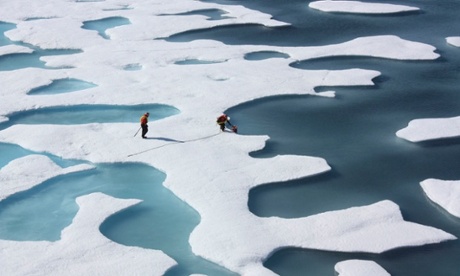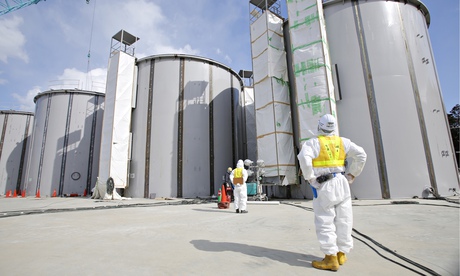Cleanup efforts have begun after a barge carrying nearly a million gallons of thick, sticky oil collided with a ship in Galveston Bay.
Coast Guard Petty Officer Andy Kendrick said Sunday morning that skimmers are recovering the oil that spilled in Saturday's collision and a boom is in place to protect environmentally sensitive areas.
Kendrick said the remaining oil is being moved off of the damaged barge.
Crews mopping up oil spill in Texas' Galveston Bay
While the seas rise in the Outer Banks and elsewhere in NC, science treads water
 There’s not much dispute these days, up and down the coast, about whether the ocean is rising. The question is: How high will it go here, and how fast?
There’s not much dispute these days, up and down the coast, about whether the ocean is rising. The question is: How high will it go here, and how fast?
North Carolinians must wait until 2016 for an official answer. That’s the law.
After promoters of coastal development attacked a science panel’s prediction that the sea would rise 39 inches higher in North Carolina by the end of this century, the General Assembly passed a law in 2012 to put a four-year moratorium on any state rules, plans or policies based on expected changes in the sea level. The law sets guidelines under which the Coastal Resources Commission, a development policy board for the 20 coastal counties, will formulate a new sea-level prediction to serve as the official basis for state planners and regulators.
Was the Los Angeles Earthquake Caused by Fracking Techniques?
 Was the 4.4-magnitude earthquake that rattled Los Angeles on Monday morning caused by fracking methods? It's hard to say, but what's clear from the above map, made by Kyle Ferrar of the FracTracker Alliance, is that the quake's epicenter was just eight miles from a disposal well where oil and gas wastewater is being injected underground at high pressure.
Was the 4.4-magnitude earthquake that rattled Los Angeles on Monday morning caused by fracking methods? It's hard to say, but what's clear from the above map, made by Kyle Ferrar of the FracTracker Alliance, is that the quake's epicenter was just eight miles from a disposal well where oil and gas wastewater is being injected underground at high pressure.
Don Drysdale, spokesman for the state agency that oversees California Geological Survey, told me that state seismologists don't think that the injection well was close enough to make a difference (and the agency has also raised the possibility that Monday's quake could have been a foreshock for a larger one). But environmental groups aren't so sure.
Climate change is putting world at risk of irreversible changes, scientists warn
 The world is at growing risk of “abrupt, unpredictable and potentially irreversible changes” because of a warming climate, America’s premier scientific society warned on Tuesday.
The world is at growing risk of “abrupt, unpredictable and potentially irreversible changes” because of a warming climate, America’s premier scientific society warned on Tuesday.
In a rare intervention into a policy debate, the American Association for the Advancement of Science urged Americans to act swiftly to reduce greenhouse gas emissions – and lower the risks of leaving a climate catastrophe for future generations.
“As scientists, it is not our role to tell people what they should do,” the AAAS said in a new report, What we know.
Another Firm That Evaluated Keystone For State Dept. Had Ties To TransCanada
The contractor that evaluated greenhouse gas emissions for the State Department's Keystone XL report is the latest company to come under fire for its ties to TransCanada, the prospective builder of the controversial pipeline.
A conflict-of-interest statement from the consulting firm ICF International, submitted to the State Department in 2012, reveals that the company had done other work for TransCanada.
How the Kings of Fracking Double-Crossed Their Way to Riches
Thanks to a series of shady deals with former subsidiaries—and massive cuts in royalties to unsuspecting landowners—the controversial shale gas firm is now awash in cash.
At the end of 2011, Chesapeake Energy, one of the nation’s biggest oil and gas companies, was teetering on the brink of failure. Its legendary chief executive officer, Aubrey McClendon, was being pilloried for questionable deals, its stock price was getting hammered and the company needed to raise billions of dollars quickly.
The money could be borrowed, but only on onerous terms. Chesapeake, which had burned money on a lavish steel-and-glass office complex in Oklahoma City even while the selling price for its gas plummeted, already had too much debt.
Ohio earthquakes linked to fracking
 Ohio authorities shut down a hydraulic fracturing, or fracking, natural gas operation in Mahoning County on Monday after two earthquakes were felt in the area, near the Pennsylvania border, local newspapers and broadcasters reported.
Ohio authorities shut down a hydraulic fracturing, or fracking, natural gas operation in Mahoning County on Monday after two earthquakes were felt in the area, near the Pennsylvania border, local newspapers and broadcasters reported.
The quakes registered magnitudes of 3.0 and 2.6, the U.S. Geological Survey’s National Earthquake Information Center said on its website.
Two smaller earthquakes were also reported later in the day.
Three years after Fukushima Daiichi melted down, Japan still feeling effects of nuclear disaster
 The complex known here as J-Village was once Japan’s largest soccer training facility. A statue in the building’s foyer depicts three soccer players battling for a ball. The logo of the Tepco Mareeze, a women’s soccer team that was disbanded in 2011, still is part of the decor. The sliding glass doors that open automatically when visitors approach are emblazoned with an image of soccer players.
The complex known here as J-Village was once Japan’s largest soccer training facility. A statue in the building’s foyer depicts three soccer players battling for a ball. The logo of the Tepco Mareeze, a women’s soccer team that was disbanded in 2011, still is part of the decor. The sliding glass doors that open automatically when visitors approach are emblazoned with an image of soccer players.
But no one plays soccer here anymore. Instead, J-Village has become the command center in the effort to clean up the nuclear catastrophe that began when a magnitude 9.0 earthquake struck off the coast of Honshu, Japan, at 2:46 p.m. on March 11, 2011, sending a 45-foot wall of water over the 19-foot protective seawall at the Fukushima Daiichi Nuclear Power Plant and triggering the worst nuclear disaster since the Chernobyl power plant in Ukraine exploded in 1986.
Fukushima operator may have to dump contaminated water into Pacific
 A senior adviser to the operator of the wrecked Fukushima Daiichi nuclear power plant has told the firm that it may have no choice but to eventually dump hundreds of thousands of tonnes of contaminated water into the Pacific Ocean.
A senior adviser to the operator of the wrecked Fukushima Daiichi nuclear power plant has told the firm that it may have no choice but to eventually dump hundreds of thousands of tonnes of contaminated water into the Pacific Ocean.
Speaking to reporters who were on a rare visit to the plant on the eve of the third anniversary of the March 2011 earthquake, tsunami and nuclear disaster, Dale Klein said Tokyo Electric Power [Tepco] had yet to reassure the public over the handling of water leaks that continue to frustrate efforts to clean up the site.
More Articles...
Page 37 of 156

 Environmental News Archive
Environmental News Archive


































